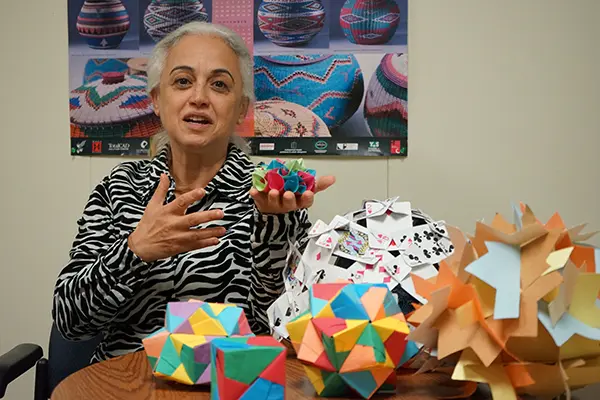Chahine to Teach, Research Ethnomathematics in U.S., South Africa
 Image by Katharine Webster
Image by Katharine Webster
12/11/2019
Contacts for media: Christine Gillette, 978-934-2209 or Christine_Gillette@uml.edu and Nancy Cicco, 978-934-4944 or Nancy_Cicco@uml.edu
LOWELL, Mass. – A UMass Lowell education professor has received a Fulbright Scholar Award to further her efforts to teach students at home and abroad about the intersection of math and South African culture.
Through the prestigious Fulbright award, Iman Chahine, an associate professor in UMass Lowell’s College of Education, will train South African teachers in high-needs districts in how to incorporate indigenous Zulu and Ndebele arts and culture into the high school math curriculum there. This will include supporting teachers in the classroom as they implement materials Chahine developed and working to adapt them as needed. Chahine will also look at whether the use of the lesson modules leads to academic gains by students.
Chahine, who joined the College of Education faculty in fall 2018, specializes in ethnomathematics: using mathematics to describe cultural practices and using hands-on cultural practices to teach math. Beadwork and baskets with repeated geometric motifs, origami and weaving are all forms of mathematical thinking, Chahine said.
“When we analyze a motif of a single, repeated pattern – not only for 3D objects, but in flat designs like Ndebele murals – we are teaching algorithmic and computational thinking,” she said.
Fulbright U.S. Scholar Awards support international research by faculty with exemplary records of academic and professional achievement, service and leadership potential. Beginning next month, Chahine will be collaborating with researchers at North-West University’s campus in Potchefstroom, South Africa.
“We’re going to use indigenous games and beadwork from Zulu culture and geometric designs from the murals that Ndebele women paint on their walls,” Chahine said. “The goal is to relate the math and science curriculum to knowledge produced by the culture itself. We need to find ways to help demystify these fields for students and help them engage.”
South Africa requires schools to incorporate indigenous knowledge systems into the K-12 curriculum, an important part of moving away from its colonial heritage and rebuilding its post-apartheid economy, Chahine said. Until recently, most schools in South Africa used European textbooks. But research shows that children learn better when they can relate their schoolwork to what they already know and experience. Research also shows that students who don’t do well in science and math have more limited career possibilities and that economies suffer as a result, she said.
“Neuroscience tells us that to retain knowledge, you have to make connections. You have to anchor that knowledge to something, or else it will disappear; students won’t remember it,” Chahine said. “If students can use math and science concepts to explore their own culture and beyond, we think they will be motivated. We want them to feel they can be participants in producing knowledge. That way, they can own it.”
The Fulbright award will pay for Chahine to travel to and live in South Africa while she works on implementation with the same colleagues. They plan to train, observe and evaluate 100 to 120 teachers working in 50 schools with a mix of cultures and languages. In addition to drawing on the culture and arts of South Africa’s indigenous tribes, Chahine says the lessons will relate to other subjects, including language and history.
While Chahine is in South Africa, colleagues in the UMass Lowell College of Education will be using a seed grant from the university to develop an ethnomathematics curriculum approach that will be employed to train teachers in schools in Lowell and Lawrence based on both South African and Southeast Asian cultures. The results of both research projects will be used to adapt the curriculum for broader use when Chahine returns.
Chahine says math teaches logical, strategic and critical thinking skills that apply to solving problems of any kind.
“We need students to understand math in the context of everyday life,” she said. “By seeing math in the context of its uses across different disciplines, we hope students will develop a confident disposition toward math and toward themselves.”
The Fulbright Program is the U.S. government’s flagship international educational exchange program and is designed to build lasting connections between the people of the United States and the people of other countries, according to the program, which operates in more than 160 nations and has had more than 390,000 students, scholars, teachers and professionals from other fields participate since 1946.
“Fulbrighters address critical global challenges in all disciplines while building relationships, knowledge and leadership in support of the long-term interests of the United States. Fulbright alumni have achieved distinction in many fields, including 59 who have been awarded the Nobel Prize, 84 who have received Pulitzer Prizes, and 37 who have served as a head of state or government,” according to the Fulbright program.
UMass Lowell is a national research university located on a high-energy campus in the heart of a global community. The university offers its more than 18,000 students bachelor’s, master’s and doctoral degrees in business, education, engineering, fine arts, health, humanities, sciences and social sciences. UMass Lowell delivers high-quality educational programs, vigorous hands-on learning and personal attention from leading faculty and staff, all of which prepare graduates to be leaders in their communities and around the globe. www.uml.edu
